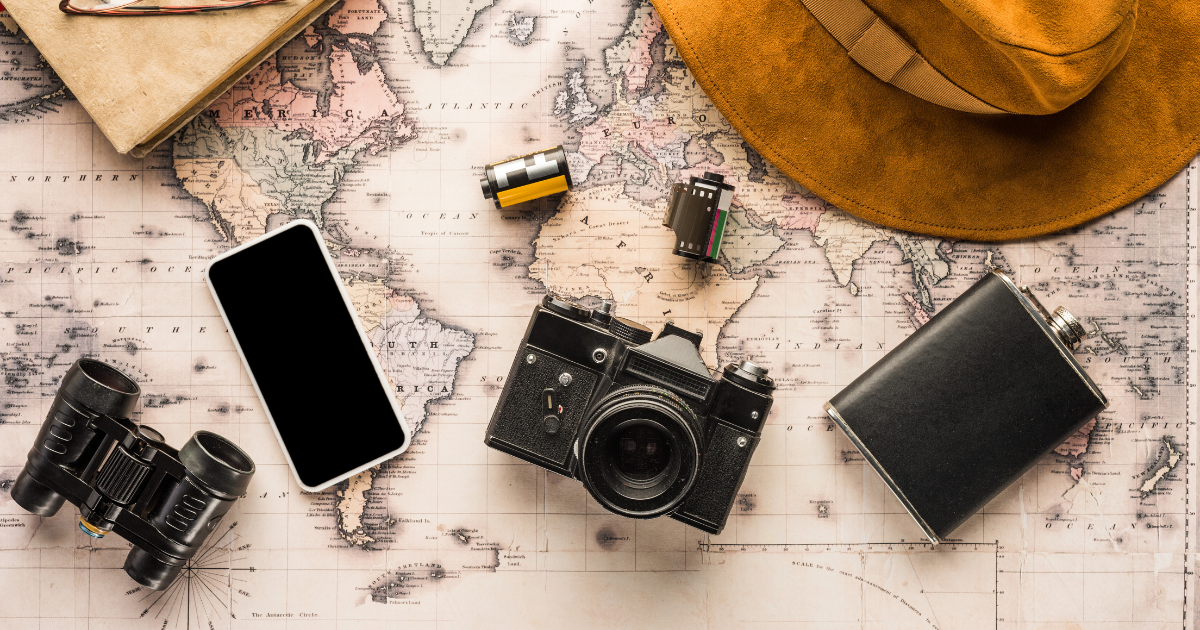Did you know that 72% of international travelers face unexpected security challenges during their trips, yet only 25% receive any formal preparation beforehand? Whether you're planning a business trip to emerging markets or a vacation to regions with elevated security concerns, a defensive foreign travel briefing might be the difference between a successful journey and a problematic one. The concept of defensive foreign travel briefing has evolved from strictly corporate and government applications to becoming an essential consideration for savvy international travelers of all types. But how do you determine if you need one for your next overseas adventure?
Table of Contents
Essential Packing List
Preparing for international travel with security awareness in mind requires thoughtful packing beyond the usual travel essentials. Here's what should make it into your luggage when security is a priority:
- Document Protection Kit: RFID-blocking wallet, document copies (physical and digital), emergency contact cards
- Communication Tools: International SIM card or eSIM, portable power bank, secure messaging apps pre-installed
- Personal Security Items: Door stop alarm, personal tracking device, money belt worn under clothing
- Health Protection: Comprehensive first aid kit, prescription medications in original packaging with doctor's note, travel insurance documentation
- Digital Security: VPN subscription activated, privacy screen protector for devices, backup authentication methods for critical accounts
- Location-Specific Items: Weather-appropriate clothing that respects local customs, appropriate footwear for quick movement if needed
- Low-Profile Accessories: Minimalist wallet with daily cash only, non-flashy watch, subdued luggage without luxury branding
Pro tip: Consider bringing items that serve dual purposes to minimize weight while maximizing preparedness. For example, a scarf can serve as a clothing accessory, a privacy shield, or even a makeshift sling in emergencies.
Timing
Planning Phase: 4-8 Weeks Before Departure
A proper defensive foreign travel briefing should begin well before your actual travel date. Ideally, start your security planning 4-8 weeks before departure—twice as early as the average traveler begins their trip preparations. This extended timeline allows for:
- Thorough country risk assessments
- Consultation with security professionals if needed
- Arrangement of secure transportation and accommodations
- Acquisition of any specialized equipment
- Completion of necessary vaccinations or health preparations
Briefing Session: 1-2 Weeks Pre-Departure
The formal defensive briefing itself typically requires 2-4 hours, depending on destination complexity and risk level. This is 300% longer than standard pre-travel consultations offered by most travel agencies, but the comprehensive coverage justifies the time investment.
Implementation: Throughout Your Journey
Defensive travel practices require consistent implementation throughout your trip, adding approximately 30-45 minutes to your daily routine for security checks, route planning, and situational awareness exercises.
Step-by-Step Itinerary
Step 1: Pre-Travel Assessment
Begin by conducting a thorough analysis of your destination's security landscape. Use resources like the State Department's travel advisories, but go deeper with specialized security reports from firms like International SOS or Global Guardian. Your goal is to identify specific risks in your exact locations, not just general country assessments.
Personal touch: Create a customized risk matrix for your exact itinerary points, scoring each location for different risk categories (theft, violent crime, political unrest, health concerns).
Step 2: Professional Consultation
If traveling to medium or high-risk destinations, schedule a professional defensive foreign travel briefing with a security consultant experienced in your destination region. These specialists provide insights rarely found in mainstream travel guides, including:
- Location-specific security protocols
- Cultural navigation strategies
- Emergency response procedures tailored to your profile
Tip: Look for consultants with recent (within 18 months) experience in your specific destination for the most current insights.
Step 3: Secure Your Digital Footprint
Implement a comprehensive digital security protocol including:
- Device hardening procedures
- Secure communication channels setup
- Social media lockdown strategy
- Data minimization plan (only bring what's necessary)
Did you know? 65% of travelers experience some form of digital security incident during international trips, making this step increasingly crucial.
Step 4: Develop Communication Protocols
Establish regular check-in procedures with trusted contacts at home:
- Primary and backup communication methods
- Pre-determined check-in schedules
- Missed check-in procedures
- Emergency contact cascade system
Personal strategy: Use a "code word" system with home contacts that can subtly indicate if you're under duress during a check-in.
Step 5: Route and Transportation Planning
Develop detailed transportation plans that prioritize security:
- Pre-vetted transportation providers
- Planned routes avoiding high-risk areas
- Alternative routes for contingencies
- Safe havens identified along common paths
Pro tip: Map your routes to identify choke points or vulnerable areas where you might be exposed to unnecessary risks.
Cost Information
Investing in proper security preparation involves various costs that should be factored into your travel budget:
- Professional Defensive Travel Briefing:
- Individual traveler: $300-$800
- Small group (2-5 people): $500-$1,200
- Corporate team: $1,500-$3,000
- Security Equipment and Preparations:
- Essential security items: $150-$300
- Enhanced communications setup: $100-$250
- Document security solutions: $50-$150
- Secure Transportation Premiums:
- Vetted drivers/services: 30-50% above standard rates
- Secure accommodation selection: 15-25% premium
- Digital Security Measures:
- Travel-specific VPN subscription: $30-$60
- Device security enhancements: $75-$200
- Temporary secure device (if required): $300-$800
- Emergency Preparation:
- Comprehensive travel insurance with security evacuation: $150-$400
- Emergency funds reserve requirement: Minimum $1,000-$2,000 accessible through multiple means
Data insight: While these costs represent a 15-20% increase in overall travel budget, corporate risk managers report a 70% reduction in security incidents for properly briefed travelers compared to those without defensive preparation.
Budget-Friendly Alternatives
Defensive travel preparation doesn't have to break the bank. Consider these cost-effective alternatives that maintain core security benefits:
- DIY Security Briefing: Research using resources like OSAC (Overseas Security Advisory Council) reports, embassy security updates, and traveler forums with recent firsthand accounts.
- Group Learning: Join community college security awareness courses or online webinars offered by travel security organizations at fraction of individual consultation costs.
- Equipment Sharing: Partner with fellow travelers to share costs of security equipment that can be used by the group.
- Selective Professional Services: Instead of comprehensive packages, purchase only the most critical components like destination-specific threat assessments.
- University Resources: Academic institutions often provide travel security resources to alumni at reduced rates.
- Free Embassy Services: Register with your country's embassy through programs like the Smart Traveler Enrollment Program (STEP) to receive security updates and support.
Creative approach: Consider a "security buddy system" where you pair with another traveler to your destination, sharing research responsibilities and checking in with each other during your journeys.
Activity Suggestions
Incorporate these security-enhancing activities into your itinerary:
- Local Orientation Walks: Conduct daytime reconnaissance of your areas during low-risk hours to identify landmarks, police stations, and potential concerns.
- Security Networking Events: Attend expatriate gatherings where security information is openly shared among long-term residents.
- Cultural Adaptation Training: Participate in immersive cultural experiences that help you blend in more effectively and reduce your profile as an obvious foreigner.
- Language Essentials Workshop: Learn key phrases that can help de-escalate situations or communicate needs during emergencies.
- Situational Awareness Games: Practice observation exercises like "spot the exit" or "identify security personnel" to sharpen your awareness skills while enjoying tourist activities.
Personalization tip: Create a progressive security practice schedule, starting with basic awareness exercises on day one and building to more complex scenarios as you become comfortable with your surroundings.
Common Mistakes to Avoid
Even experienced travelers make these security preparation errors:
- Over-relying on Generic Advice: Destination-specific knowledge is crucial; what works in one country may be dangerous in another.
- Solution: Seek advice from people who have recently been to your specific destination within the past 12 months.
- Neglecting Digital Security: 78% of travelers focus solely on physical security while ignoring significant digital vulnerabilities.
- Solution: Apply the same level of preparation to your digital presence as you do to physical safety.
- Cultural Insensitivity: Security isn't just about avoiding criminals; it's about not creating unnecessary friction through cultural missteps.
- Solution: Include cultural briefing as part of your defensive travel preparation.
- Inconsistent Application: Many travelers start with good security practices but become complacent after a few uneventful days.
- Solution: Create a daily security routine checklist to maintain discipline throughout your trip.
- Failing to Update Risk Assessments: Security situations can change rapidly, yet 65% of travelers never reassess risks during their trips.
- Solution: Schedule regular risk review sessions during your journey, especially after significant local events.
Travel Planning Tips
Maximize the effectiveness of your defensive foreign travel briefing with these planning strategies:
- Strategic Timing: Schedule arrivals during daylight hours, allowing time to orient yourself safely before nightfall.
- Accommodation Selection: Choose properties based on security features rather than just amenities; mid-floor rooms (floors 3-6) offer optimal balance between emergency exit access and targeted intrusion prevention.
- Local Intelligence Network: Develop relationships with trustworthy locals immediately upon arrival—hotel staff, established business contacts, or embassy-recommended resources.
- Adaptive Planning: Build flexibility into your schedule, allowing for route or activity changes based on evolving security conditions.
- Information Discipline: Practice careful control of sharing travel details—72% of security incidents begin with information unnecessarily shared on social media or with casual acquaintances.
Best practice insight: Create a "daily intelligence routine" where you spend 10-15 minutes each morning reviewing local news, checking embassy alerts, and adjusting your day's plans accordingly.
Conclusion
A defensive foreign travel briefing transforms your journey from potentially vulnerable to confidently secure. By investing time in proper assessment, preparation, and implementation of security protocols tailored to your specific destination, you gain not just peace of mind but genuine protection against common travel risks. The combination of professional guidance, personal awareness, and practical security measures creates a comprehensive shield that allows you to focus on your travel purposes without unnecessary worry.
Ready to elevate your travel safety? Consider implementing these defensive travel practices for your next international journey, and share your experiences in our comment section below. Subscribe for more detailed guides on destination-specific security preparations and traveler safety innovations.
FAQs
What exactly is a defensive foreign travel briefing?
A defensive foreign travel briefing is a structured security preparation process that assesses destination-specific risks and provides travelers with practical strategies, protocols, and knowledge to mitigate those risks during international travel. Unlike general travel advice, these briefings are tailored to both the destination and the traveler's specific profile and needs.
How do I know if I need a defensive travel briefing?
Consider factors like your destination's risk level (check government travel advisories), your visibility profile (business traveler vs. tourist), the sensitivity of your work, your personal security history, and your familiarity with the region. If your destination has elevated crime rates, political instability, or you're carrying valuable equipment or information, a briefing is highly recommended.
Can I conduct my own defensive travel briefing without professional help?
Yes, for lower-risk destinations, self-briefing using reliable resources like government advisory services, recent academic research, and expatriate forums can be effective. However, for medium to high-risk regions, professional guidance provides critical insights that public sources may not cover adequately.
How far in advance should I schedule a defensive travel briefing?
Ideally, begin the process 4-8 weeks before departure to allow sufficient time for thorough preparation, equipment acquisition, and skills practice. However, even a last-minute briefing (1-7 days before) is vastly better than traveling unprepared.
Does having a defensive travel briefing make me paranoid or ruin my travel experience?
Quite the contrary—proper security preparation actually enhances travel enjoyment by reducing background anxiety and providing confidence to explore more freely. It's similar to how knowing how to swim makes being near water more enjoyable rather than stressful.
How do I find qualified professionals for a defensive travel briefing?
Look for security consultants with verifiable experience in your specific destination country, professional credentials in travel security, and references from similar travelers. Many international security firms, specialized travel security consultancies, and some executive protection agencies offer these services.
You May Also Like :
Free Guide To Rome
Free Guide To Istanbul
Free Guide To London
Free Guide To Bangkok
Free Guide To Paris
Free Guide To Dubai
Free Guide To Sicily
Lonely Planet – Travel Guides & Inspiration
Explore expert travel guides, tips, and recommendations to help you plan your next adventure.
Viator – Book Local Tours & Activities
Discover and book unique local tours, excursions, and experiences in destinations worldwide.
Sustainable Travel International
Learn how to travel responsibly and sustainably to preserve the environment and support local communities.


